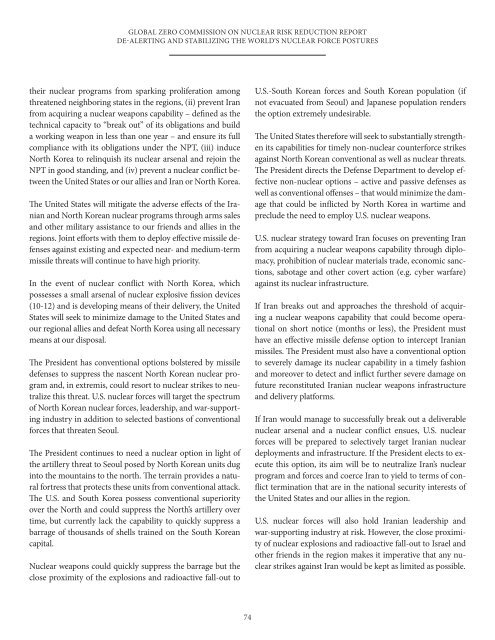global_zero_commission_on_nuclear_risk_reduction_report
global_zero_commission_on_nuclear_risk_reduction_report
global_zero_commission_on_nuclear_risk_reduction_report
You also want an ePaper? Increase the reach of your titles
YUMPU automatically turns print PDFs into web optimized ePapers that Google loves.
GLOBAL ZERO COMMISSION ON NUCLEAR RISK REDUCTION REPORTDE-ALERTING AND STABILIZING THE WORLD’S NUCLEAR FORCE POSTUREStheir <strong>nuclear</strong> programs from sparking proliferati<strong>on</strong> am<strong>on</strong>gthreatened neighboring states in the regi<strong>on</strong>s, (ii) prevent Iranfrom acquiring a <strong>nuclear</strong> weap<strong>on</strong>s capability – defined as thetechnical capacity to “break out” of its obligati<strong>on</strong>s and builda working weap<strong>on</strong> in less than <strong>on</strong>e year – and ensure its fullcompliance with its obligati<strong>on</strong>s under the NPT, (iii) induceNorth Korea to relinquish its <strong>nuclear</strong> arsenal and rejoin theNPT in good standing, and (iv) prevent a <strong>nuclear</strong> c<strong>on</strong>flict betweenthe United States or our allies and Iran or North Korea.The United States will mitigate the adverse effects of the Iranianand North Korean <strong>nuclear</strong> programs through arms salesand other military assistance to our friends and allies in theregi<strong>on</strong>s. Joint efforts with them to deploy effective missile defensesagainst existing and expected near- and medium-termmissile threats will c<strong>on</strong>tinue to have high priority.In the event of <strong>nuclear</strong> c<strong>on</strong>flict with North Korea, whichpossesses a small arsenal of <strong>nuclear</strong> explosive fissi<strong>on</strong> devices(10-12) and is developing means of their delivery, the UnitedStates will seek to minimize damage to the United States andour regi<strong>on</strong>al allies and defeat North Korea using all necessarymeans at our disposal.The President has c<strong>on</strong>venti<strong>on</strong>al opti<strong>on</strong>s bolstered by missiledefenses to suppress the nascent North Korean <strong>nuclear</strong> programand, in extremis, could resort to <strong>nuclear</strong> strikes to neutralizethis threat. U.S. <strong>nuclear</strong> forces will target the spectrumof North Korean <strong>nuclear</strong> forces, leadership, and war-supportingindustry in additi<strong>on</strong> to selected basti<strong>on</strong>s of c<strong>on</strong>venti<strong>on</strong>alforces that threaten Seoul.The President c<strong>on</strong>tinues to need a <strong>nuclear</strong> opti<strong>on</strong> in light ofthe artillery threat to Seoul posed by North Korean units duginto the mountains to the north. The terrain provides a naturalfortress that protects these units from c<strong>on</strong>venti<strong>on</strong>al attack.The U.S. and South Korea possess c<strong>on</strong>venti<strong>on</strong>al superiorityover the North and could suppress the North’s artillery overtime, but currently lack the capability to quickly suppress abarrage of thousands of shells trained <strong>on</strong> the South Koreancapital.Nuclear weap<strong>on</strong>s could quickly suppress the barrage but theclose proximity of the explosi<strong>on</strong>s and radioactive fall-out toU.S.-South Korean forces and South Korean populati<strong>on</strong> (ifnot evacuated from Seoul) and Japanese populati<strong>on</strong> rendersthe opti<strong>on</strong> extremely undesirable.The United States therefore will seek to substantially strengthenits capabilities for timely n<strong>on</strong>-<strong>nuclear</strong> counterforce strikesagainst North Korean c<strong>on</strong>venti<strong>on</strong>al as well as <strong>nuclear</strong> threats.The President directs the Defense Department to develop effectiven<strong>on</strong>-<strong>nuclear</strong> opti<strong>on</strong>s – active and passive defenses aswell as c<strong>on</strong>venti<strong>on</strong>al offenses – that would minimize the damagethat could be inflicted by North Korea in wartime andpreclude the need to employ U.S. <strong>nuclear</strong> weap<strong>on</strong>s.U.S. <strong>nuclear</strong> strategy toward Iran focuses <strong>on</strong> preventing Iranfrom acquiring a <strong>nuclear</strong> weap<strong>on</strong>s capability through diplomacy,prohibiti<strong>on</strong> of <strong>nuclear</strong> materials trade, ec<strong>on</strong>omic sancti<strong>on</strong>s,sabotage and other covert acti<strong>on</strong> (e.g. cyber warfare)against its <strong>nuclear</strong> infrastructure.If Iran breaks out and approaches the threshold of acquiringa <strong>nuclear</strong> weap<strong>on</strong>s capability that could become operati<strong>on</strong>al<strong>on</strong> short notice (m<strong>on</strong>ths or less), the President musthave an effective missile defense opti<strong>on</strong> to intercept Iranianmissiles. The President must also have a c<strong>on</strong>venti<strong>on</strong>al opti<strong>on</strong>to severely damage its <strong>nuclear</strong> capability in a timely fashi<strong>on</strong>and moreover to detect and inflict further severe damage <strong>on</strong>future rec<strong>on</strong>stituted Iranian <strong>nuclear</strong> weap<strong>on</strong>s infrastructureand delivery platforms.If Iran would manage to successfully break out a deliverable<strong>nuclear</strong> arsenal and a <strong>nuclear</strong> c<strong>on</strong>flict ensues, U.S. <strong>nuclear</strong>forces will be prepared to selectively target Iranian <strong>nuclear</strong>deployments and infrastructure. If the President elects to executethis opti<strong>on</strong>, its aim will be to neutralize Iran’s <strong>nuclear</strong>program and forces and coerce Iran to yield to terms of c<strong>on</strong>flictterminati<strong>on</strong> that are in the nati<strong>on</strong>al security interests ofthe United States and our allies in the regi<strong>on</strong>.U.S. <strong>nuclear</strong> forces will also hold Iranian leadership andwar-supporting industry at <strong>risk</strong>. However, the close proximityof <strong>nuclear</strong> explosi<strong>on</strong>s and radioactive fall-out to Israel andother friends in the regi<strong>on</strong> makes it imperative that any <strong>nuclear</strong>strikes against Iran would be kept as limited as possible.74


